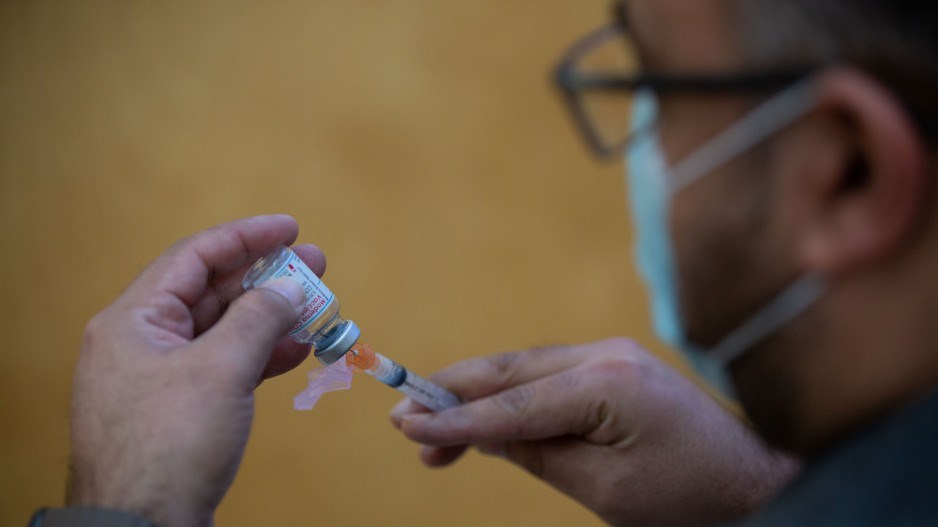When Research Co. and Glacier Media asked earlier this month, 61% of Canadians say they are satisfied with the vaccination plans and phases outlined by their province, up seven points since our previous survey in late March.
Similar proportions of Canadians are also content with the pace of vaccination efforts in their province (58%, up 10 points) and the procurement of vaccine doses from the federal government (57%, up nine points).
These results outline significant gains in the nationwide average but veil the despair of residents of two specific provinces that was evident when we queried about government performance. Only 48% of residents of Alberta and Ontario are satisfied with how the vaccination process has unfolded in their province. In Quebec and British Columbia, the results on this question are 69% and 62% respectively.
The fact that the first dose of the vaccine is now in the bodies of a majority of the country’s adults has also made more residents hopeful that a milestone promised by the Public Health Agency of Canada (PHAC) in December will actually be met.
The PHAC expected every wiling Canadian to be inoculated against COVID-19 by the end of September 2021. This month, 65% of Canadians think the goal will be attained, up 15 points since March and 20 points since February.
One of the intangibles of the PHAC’s promise is the willingness of Canadians to be vaccinated. This month, there is some positive momentum on this matter. For the first time, more than four in five Canadians (83%) say they have already been inoculated or plan to have a first shot when they get the chance.
This leaves 13% of the country’s adults who will “definitely” or “probably” not get a shot against COVID-19 – a proportion that rises to 20% among those who voted for the Conservative Party in the 2019 federal election.
There is a fascinating split among the 12% of Canadians who do not consider COVID-19 a real threat. We found that 49% of these skeptics have decided they will not get inoculated, but 48% will or have already done so.
A question on allowing K-12 students to go back to in-class learning yielded some major regional disparities. In British Columbia, where school has been largely uninterrupted over the past few weeks, 60% of residents endorse the idea. In Ontario, where instruction has been remote since mid-April, 52% of residents support a return to the classroom.
As some provinces deal with new travel restrictions, views on curbing tourism of several kinds have not gone through a major fluctuation. Practically four in five Canadians continue to endorse keeping the border with the United States closed to non-essential travel (80%, down three points) and placing all travellers arriving to Canada into a mandatory 14-day quarantine or isolation period (79%, also down three points).
While most Canadians foresee the end of the pandemic, we are not ready to abandon the guidelines that brought us to this position. There is virtually no change in our wish to prohibit non-essential travel from one province to another (74%, unchanged) and prohibit non-essential travel inside provinces (67%, down one point).
Our own behaviour, however, is not fully coinciding with regulations. While 84% of Canadians believe it is correct to require all customers or visitors entering an indoor premise to wear a mask while inside, only 75% of respondents have one every time they go out. Women (82%) and Canadians aged 55 and over (80%) lead the way on not leaving the home without a face covering. Men (69%) and Canadians aged 18 to 34 (71%) are more oblivious.
Some aspects of life at home appear to be getting simpler. The proportion of Canadians who fear infection from ordering food from restaurants has fallen to 15%, and those who are overeating have dropped to 29%. On the other hand, we still see 16% of Canadians having a bath or shower less often than before the pandemic (including 20% of those aged 18 to 34) and 11% preferring not to brush their teeth as often (including 21% of Albertans).
One other feature of confinement is not going remarkably well. One in five Canadians (20%) say they are losing their temper more than usual at home during the outbreak. The country’s youngest adults are more likely to acknowledge this setback (28%) than those aged 35 to 54 (20%) and those aged 55 and over (13%). We will have to see if these numbers change as more Canadians aged 18 to 34 get their first shot of the vaccine.
Mario Canseco is president of Research Co.
Results are based on an online study conducted from May 17 to May 19, 2021, among 1,000 Canadian adults. The data has been statistically weighted according to Canadian census figures for age, gender and region. The margin of error, which measures sample variability, is plus or minus 3.1 percentage points, 19 times out of 20.




